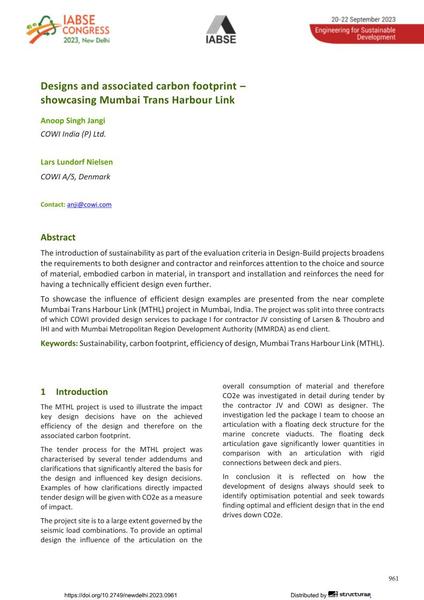Designs and associated carbon footprint – showcasing Mumbai Trans Harbour Link

|
|
|||||||||||
Bibliographic Details
| Author(s): |
Anoop Singh Jangi
(COWI India (P) Ltd.)
Lars Lundorf Nielsen (COWI A/S, Denmark) |
||||
|---|---|---|---|---|---|
| Medium: | conference paper | ||||
| Language(s): | English | ||||
| Conference: | IABSE Congress: Engineering for Sustainable Development, New Delhi, India, 20-22 September 2023 | ||||
| Published in: | IABSE Congress New Delhi 2023 | ||||
|
|||||
| Page(s): | 961-968 | ||||
| Total no. of pages: | 8 | ||||
| DOI: | 10.2749/newdelhi.2023.0961 | ||||
| Abstract: |
The introduction of sustainability as part of the evaluation criteria in Design-Build projects broadens the requirements to both designer and contractor and reinforces attention to the choice and source of material, embodied carbon in material, in transport and installation and reinforces the need for having a technically efficient design even further. To showcase the influence of efficient design examples are presented from the near complete Mumbai Trans Harbour Link (MTHL} project in Mumbai, India. The project was split into three contracts of which C0WI provided design services to package I for contractor JV consisting of Larsen & Thoubro and IHI and with Mumbai Metropolitan Region Development Authority (MMRDA} as end client. |
||||
| Keywords: |
sustainability carbon footprint efficiency of design Mumbai Trans Harbour Link (MTHL}
|
||||
